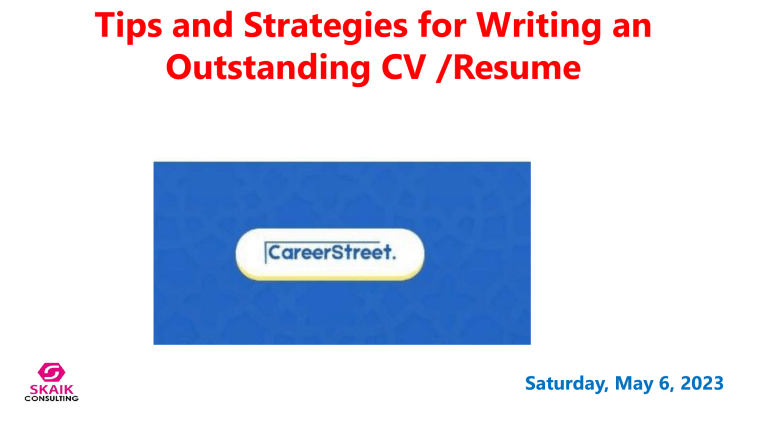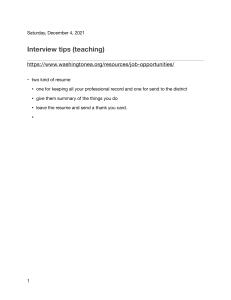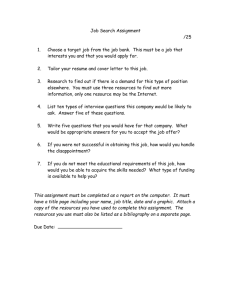
Tips and Strategies for Writing an Outstanding CV /Resume Saturday, May 6, 2023 Facilitators Irene Ampomaa Ohene & Modesta Alhassan, HR Professionals LEARNING OBJECTIVES Participants should be able to learn how to tailor their resumes to specific job postings to increase their chances of getting noticed. Participants should be able to learn how to create a visually appealing and professional-looking resume, including tips on formatting and design. Participants should be able to get an understanding of the most important information to include on their resumes, including education, work experience, and skills Participants should gain an understanding of the most important resume trends and best practices, including how to make their resume ATS-friendly Ice breaker What is your expectation for today’s discussion. What is the difference between cv and resume, are they the same? Sourcing for vacancy The main sources used by employers includes: • • • • • • • • • • Corporate website Recruitment agencies Employee referral Professional networking, e.g. CIHRM, SPHRi, Commercial job boards Specialist journals Search consultants Links with educational establishments- e.g. Entry level jobs National and local newspaper advertisements Social networking sites- LinkedIn A Good C.V. What is a Curriculum Vitae “CV”? "the course of one's life/career” provides a comprehensive overview of your academic background, skills, experience and professional accomplishments to potential employers An Outstanding C.V. Full Name- BOLD at the top 1. Personal Information Address; phone number(s); email address *Date of birth is quite irrelevant unless stated. A Good C.V. Summary of who you are and some unique competencies you possess 2. (SEAT) Summary SKILLS & ABILITIES Profile EDUCATION & EXPERIENCE ACHIEVEMENTS TYPE OF PERSONALITY A Good C.V. Period (Month and Year) – Start and End 3. Education Program/ Course of Study Institution of Study Location/ Place of study A Good C.V. 4. Employment Period (Month and Year) – Start and End Employer/ Place of Work History/ Work Experience Designation/ Role Duties/ Achievements A Good C.V. Course Title/ Seminar 5. Trainings and Organizers Date/ Period Seminars Place A Good C.V. Awards Interests 6. Others I.T. Skills Associations/ Groups Professional Membership Reference Other Things to Keep in Mind, C.V. CV should be well organized and consistent. Be sure that all information is correctly lined up and organized. Make the CV as easy to read as possible. Proofread the CV more than once. Ask for help from Career Counselor/ Advisor Tips on formatting and design of a CV Avoid titling the document ‘ curriculum vitae’ Instead let your name serve as the title. Section headings are a good way to break up your cv (increase font) Avoid fonts such as comic sans, instead us TNR, Arial & Calibri, font size 10 and 12. List everything in reverse chronological order. Keep it concise by using clear spacing and bullet points Strategies for writing a good CV Use active verbs when possible like created, analyzed to show initiative. Avoid wrong spellings and grammatical mistakes. Avoid generic, over–used phrases such as team player, multitasker rather provide real-life examples to demonstrate these skills. Tailor your cv to the JD Advertised and avoid exaggeration Make sure your email sounds professional. Competencies recruiters are looking out for during an Interview. This chart illustrates the competencies required for a role. Other tools for selection • Behavioral Assessment tests • Psychometric Tests: www.16personalities.com • Presentations Effective Job Seeking Skills Helpful tips to navigate the job search process Expect to apply five to 10 times the number of jobs that you had planned for Set aside time each day to search and apply for jobs. Finding a job is a job in itself. Keep your online profile updated. Make sure your social presence reflects you in the best light Use online job search sites such as LinkedIn etc. Tailor your cover letter and resume to the specific job for which you are applying. Be willing to take a temporary job to demonstrate your abilities. Boost Your Skills/ professional development Practice a virtual or phone interview before the actual one happens. Cont.…. Know yourself Be confident SWOT Analysis Be clear about what you want Dress well Understand the path of getting there (try) Speak to people/ Ask people for opportunities Don’t worry……. Don’t be afraid Network The Interview process- In person/Virtual Virtual interview is an interview that takes place remotely, sometimes over the phone, but often using technology like video conferencing and other online communication platforms. Tools used to conduct digital interviews: Skype Zoom Google Meet Microsoft teams Whatup video/audio etc. Tips for Online Interview • Do a test-run with your computer and technology • Pick the perfect spot/ location. • Eliminate distractions. • Sit up and dress professionally. • Calm your nerves/ Be Yourself. • Monitor your professional Body Language • Build rapport • Follow up Things to avoid saying in a job interview • • • • • • • • • Negativity about a previous employer or job I don't know. It's on my resume. Unprofessional language I don't have any questions. Asking what the company does Overly prepared answers or clichés Discussions about your lack of experience Personal information not relevant to the job or your qualifications Basic Interview Skills • Able to control emotions. • Friendly demeanor. • Talent recognition skills • Knowledge of the job in question. • Experience managing people. • Listening skills. • Questioning skills Value Addition Skills Required Complex Problem Solving Critical Thinking Creativity People Management Coordinating with Others/team building Cont.….. Emotional Intelligence Judgment and Decision Making Service Orientation Negotiation Skills Complex Problem Solving Cognitive Flexibility Q&A Sample outstanding cv. Thank You SKAIK CONSULTING +233540262092 info@skaikconsulting.om www.skaikconsulting.com BEST FOR You O R G A N I C S C O M P A N Y 29





